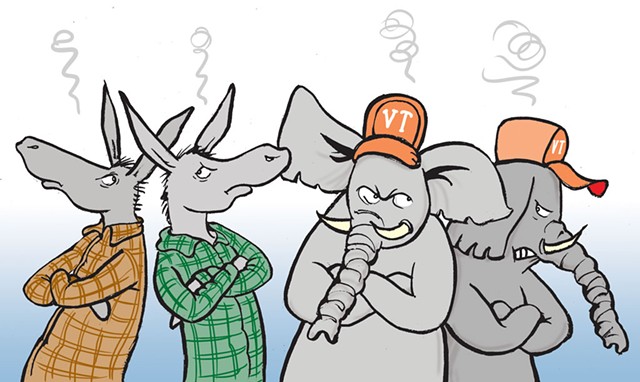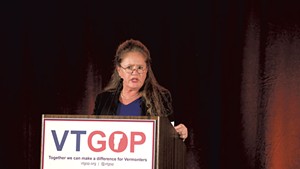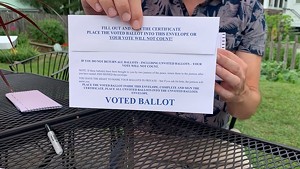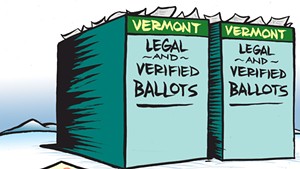
- Tim Newcomb
Kevin Burgess, the Vermont Democratic Party's director of outreach, quit earlier this month, citing a "toxic" work environment and a "complete and utter failure of party leadership." Days later, Scott McNeil, the party's executive director, announced he's leaving, too.
The Vermont GOP is also in disarray, split between fealty to and disdain for former president Donald Trump. Burlington's 19-year-old GOP chair, Kolby LaMarche, recently called on state party chair and Trump supporter Deb Billado to resign. When that didn't happen, he stepped down himself.
Meanwhile, groups such as Emerge Vermont, an affiliate of a national group that recruits and trains Democratic women to run for office, and the newly formed Bright Leadership Institute, a stand-alone, nonpartisan group supporting candidates of color, have taken up some of the functions formerly handled by political parties.
And for some time, politicians ranging from Trump to Republican Gov. Phil Scott to former Progressive/Democratic lieutenant governor David Zuckerman have been freelancing, running their own campaigns without marching in lockstep with any party platform.
The casual observer might conclude the parties are about to implode and politicians don't need them anymore. But despite their current problems, Vermont's political parties play a critical — though often invisible and thankless — role in recruiting and electing candidates, especially to the legislature.
"For us in the House, the critical connection between the Vermont Democratic Party and the House Democratic caucus is our House campaign director, and that's Spencer Dole," said Rep. Emily Long (D-Newfane), who is in her fourth term in the House and first as majority leader. Dole's full-time party job is crucial to members, she said: "That staffer runs the House campaign and gives all of us in the caucus the staff support that we need, because members don't have staff ... We have that in spades in Spencer Dole."
For years the House and Senate caucuses had their own political action committees that raised money for their members' campaigns. In 2015, Vermont passed legislation that banned lawmakers from collecting contributions from lobbyists while the legislature was in session. That actually increased the role of the parties. When House Democratic lawmakers and lobbyists get together on Thursday, February 25, for a virtual version of the annual Speaker's Soiree fundraiser, it will be under the auspices of the state Democratic Party, not a PAC run by the speaker or the House Democratic caucus.
On Monday former representative Kurt Wright, a Burlington Republican who sponsored the 2015 ban, called it "disappointing" that House Democrats had figured out a way to skirt the ban on hitting up lobbyists for cash while lawmakers are in session.
As for the recent departures of two senior staff members from party headquarters, Long said she wasn't worried: "I think that if there are challenges, the [party] executive committee and the state committee will look at those, and they will address any issues that arise and grow from it."
Senate Majority Leader Alison Clarkson (D-Windsor), who, like Long, is in her first term in that role, said the "party so far has been a very productive partner, very enabling." She pointed to its role as coproducer of a February 4 Senate fundraiser that drew about 125 people and raised more than $20,000.
But in the eyes of Sen. Kesha Ram (D-Chittenden), the first woman of color to serve in the Senate, the parties, including her own Democratic Party, have a lot of work to do to remain relevant to people from historically marginalized communities. Ram spoke at a news conference announcing the founding of the Bright Leadership Institute earlier this month.
"In order to have a representative democracy, our political parties must commit to making it safe and affordable for candidates to run," Ram said in an email to Fair Game. "Progress in that area has been slow and uneven, and Black women particularly have borne the brunt of that lack of support. Meanwhile, Black and Brown people have constantly stepped in to save the Democratic Party, despite being under-resourced and underrepresented in its leadership and networks."
Ram, a first-term senator who previously served in the House, cited herself as an example.
"The outgoing Executive Director of the Democratic Party has never spoken to me once," she wrote. "He never asked me as a candidate nor as the only woman of color in the State Senate how we could collaborate to address injustice or bring more voices into our process. I am sure I am not alone in that experience, and it was built on years of tokenization and marginalization from the party leaders before him."
She's hopeful for improvement, though, Ram wrote. Now that people of color are coming to the table, "I do see a willingness to change and dismantle the toxic culture within the party. We have to get it right this time or the party will not be of great service to Vermont's future."
If the Democratic Party is traveling a bumpy road, the wheels may be coming off the VTGOP. A feud has been going on for much of the Trump administration and its aftermath, with exchanges of rhetorical fire between moderates, including the governor, and Trump supporters, including some county committee chairs and Billado, the party chair.
Linda Fowler, a professor emerita of government at Dartmouth College, said she does not see loyalty to Trump as the key to success for the GOP, at least in Vermont. If Trumpists dominate the party, "they choose to be less relevant by following a path that is so inconsistent with where Vermont voters are," she said.
Fowler added, "Vermont has quite a centrist electorate, I would say. If the Republicans in the state want to continue to be a minority party, they should keep doing what they're doing."
Sen. Chris Pearson (P/D-Chittenden) said he thinks Republicans and Democrats have one big thing in common: Both are straining to reconcile more centrist and more extreme elements within their ranks. He suggested that American politics might be heading for a four-way split, with left, center-left, center-right and right parties. Such a realignment, coupled with ranked-choice voting, could make for a healthier democracy, Pearson argued.
If I had to bet, I'd wager against Pearson's vision coming to pass. I'd put money on the Democratic Party growing more diverse and weathering occasional internal blowups as it muddles its way into the future. And I wouldn't bet a dime for or against Republicans getting their act together, because as long as there's still even a whiff of Trump in the air, that party's future is too difficult to predict with any confidence.
Not-So-Massive Fraud
On January 27, I wrote about efforts by Rob Roper, president of the Ethan Allen Institute, to raise alarms about fraud connected to mail-in voting. I said there did not appear to be evidence that it was a problem in Vermont's November election, given that the Secretary of State's Office found only seven out of about 374,000 ballots were questionable enough to warrant alerting law enforcement.
Attorney General T.J. Donovan, in turn, deemed only one of those seven cases worthy of prosecution. That one involved a "provocateur" who was trying to prove there are security flaws around mail-in voting, Donovan said.
Chris Goddard of Burlington mailed in a ballot but then headed to vote in person, authorities said.
"Goddard was told by the Ward 7 clerk that records indicated he had already cast an absentee ballot. Goddard asserted that he had not," according to a copy of the settlement agreement obtained by Fair Game. "The Ward 7 clerk gave Goddard a provisional ballot, a provisional ballot envelope and an 'Affidavit of No Ballot Cast,'" the document said.
Goddard signed the sworn affidavit and the ballot envelope, placed the provisional ballot — still blank — in the envelope and "returned all items to the Ward 7 clerk." It appears that, by leaving the ballot blank, he didn't actually vote twice but did enough to get in trouble. His case concluded with a $400 civil fine.
So that's where we are three months after the election. Out of about 374,000 voters, it appears one tried to game the system in just-kidding style to prove a point — and got caught.
Media Note: New Seven Dayser
Veteran Vermont journalist Anne Wallace Allen joined Seven Days as of this week. She comes to us from VTDigger.org.
"She'll be doing for us pretty much what she did there ... covering business and the economic impact of COVID; guber press conferences and breaking news," Seven Days publisher and coeditor Paula Routly wrote in an email to staff.
Allen told Fair Game she's psyched for the change. "I am really looking forward to being part of this talented team," she said.
I know Anne from our days working together at the Associated Press a couple decades ago. My prediction is: We're going to be happy to have her skills and energy at Seven Days.













Comments
Comments are closed.
From 2014-2020, Seven Days allowed readers to comment on all stories posted on our website. While we've appreciated the suggestions and insights, right now Seven Days is prioritizing our core mission — producing high-quality, responsible local journalism — over moderating online debates between readers.
To criticize, correct or praise our reporting, please send us a letter to the editor or send us a tip. We’ll check it out and report the results.
Online comments may return when we have better tech tools for managing them. Thanks for reading.